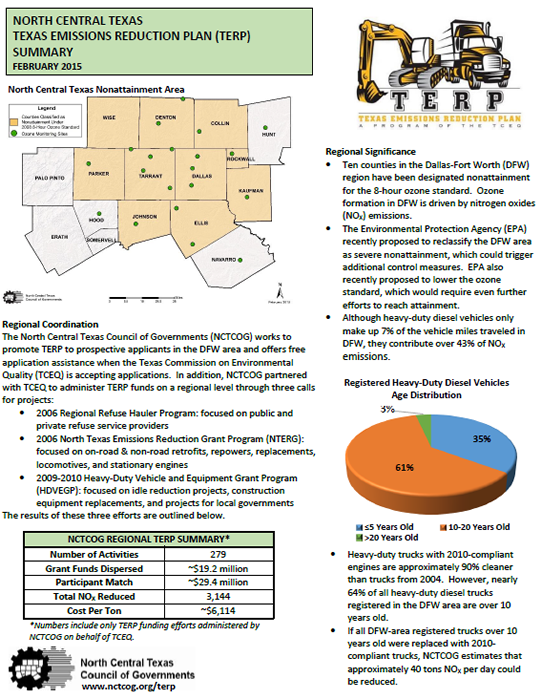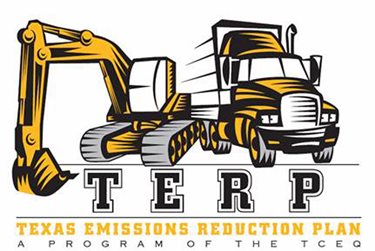Texas Emissions Reduction Plan (TERP) Partnership Program
 The Texas Emissions Reduction Plan (TERP) program, established by the Texas legislature in 2001, is a comprehensive set of incentive programs aimed at improving air quality in Texas by reducing emissions of oxides of nitrogen (NOx) from both on-road and non-road high-emitting internal combustion engines. This program is instrumental in efforts to achieve ozone standards in the Dallas-Fort Worth (DFW) ozone nonattainment area. The RTC Legislative Program includes support for full funding for TERP.
The Texas Emissions Reduction Plan (TERP) program, established by the Texas legislature in 2001, is a comprehensive set of incentive programs aimed at improving air quality in Texas by reducing emissions of oxides of nitrogen (NOx) from both on-road and non-road high-emitting internal combustion engines. This program is instrumental in efforts to achieve ozone standards in the Dallas-Fort Worth (DFW) ozone nonattainment area. The RTC Legislative Program includes support for full funding for TERP.
The Texas Commission on Environmental Quality (TCEQ) administers TERP grants statewide. The North Central Texas Council of Governments (NCTCOG) partners with TCEQ in two major ways:
- TERP Outreach: NCTCOG promotes TERP to prospective applicants in the DFW area and provides free application assistance upon request when funding rounds are open. NCTCOG teamed with local leaders from several different agencies to complete a major outreach effort was made in 2008 in anticipation of an ozone attainment deadline. Details are in the following report: TERP Outreach for North Texas - Final Report
- Third-Party TERP Grants: NCTCOG has periodically entered into contracts with TCEQ to administer TERP funding on behalf of TCEQ. Three funding initiatives have been completed to date, and results are summarized below. More details are available here.
|
Results of Third-Party TERP Programs Administered by NCTCOG
|
|
Call for Projects
|
Regional Refuse Hauler Program (2006)
|
North Texas Emissions Reduction Grant Program (2006)
|
Heavy-Duty Vehicle and Equipment Grant Program (2009-2010)
|
Total of all NCTCOG Third-Party TERP Funding Initiatives
|
|
Number of Activities Funded
|
53
|
51
|
175
|
279
|
|
Grant Funds Disbursed
|
$780,128
|
$10,732,933
|
$7,711,407
|
$19,224,468
|
|
Subgrantee Matching Funds
|
$7,049,249
|
$6,974,121
|
$15,422,500
|
$29,445,870
|
|
Tons NOX Reduced (Over Activity Life)
|
157
|
2,070
|
917
|
3,144
|
|
Cost per Ton
|
$5,000
|
$5,184
|
$8,409
|
$6,115
|
For more information on NCTCOG TERP Partnership efforts, contact Lori Clark.
